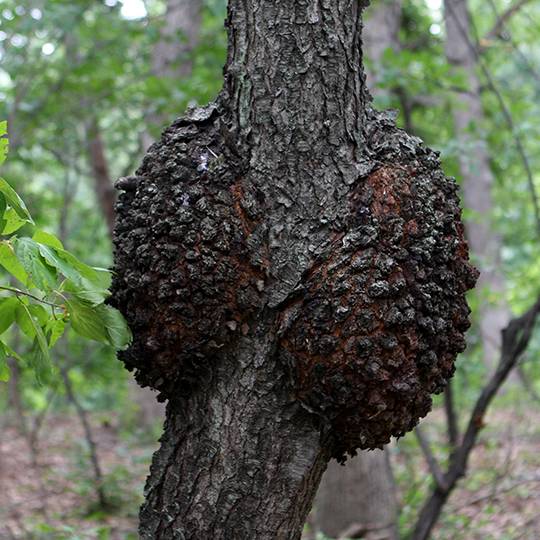
Caused by a fungus (Apiosporina morbosa), black knot is a common disease that affects many types of fruit trees, but mainly wild and cultivated plum and cherry trees. It creates knobby dark growths on the trunk and branches that may eventually lead to the tree’s death.
The disease spreads in the springtime. When it rains, the fungus releases spores that are carried by the wind and take hold on newer growths or unhealthy branches. Outbreaks are common in wild or neglected trees and can spread to the well-maintained trees in your yard. Some large and healthy trees are able to withstand the symptoms, but younger or weaker ones are most susceptible.
Black Knot Signs and Symptoms
The most distinctive feature of black knot is a gnarled swelling called a gall. After the fungal spore lands on a branch and the infection takes hold, a small olive-green swelling develops. This gall grows over a period of 2 to 3 years, hardening and turning black, until it is about 4 to 6 inches in size. Mature galls are responsible for spreading the infection by producing more spores. The fungus continues to grow on both the inside and outside of the tree, and eventually the gall surrounds the branch, killing the leaves and twigs that grow beyond it.
Preventing and Treating Black Knot
Fortunately, black knot is an easy disease to diagnose because of the distinctive nature of the swellings. It is more easily noticed during the winter months when trees have shed their leaves.
Pruning. The time to remove all branches with black knot is in the late winter. When pruning, remove at least 4 inches of the healthy branch beyond the growth. Be sure to clean and disinfect the cutting tools after pruning, so as not to spread the disease the next time you use them. Also, properly dispose of all infected branches because they are still capable of spreading the disease even after they are pruned.
Fungicides can be used to protect younger trees. It’s critical that you remove the existing galls on infected trees in late winter before you apply the fungicides in early spring to protect the newer trees. The time to apply the fungicide treatment is when the flower buds are just beginning to bloom.
For assistance identifying, treating, and preventing black knot and other tree diseases, contact Elite Tree Care today at 610-935-2279.
Need Help with Black Knot?
Call Elite Tree Care today at 610-935-2279 and let's talk about how we can help you with Black Knot and other Pennsylvania tree diseases.
Get a Free Quote